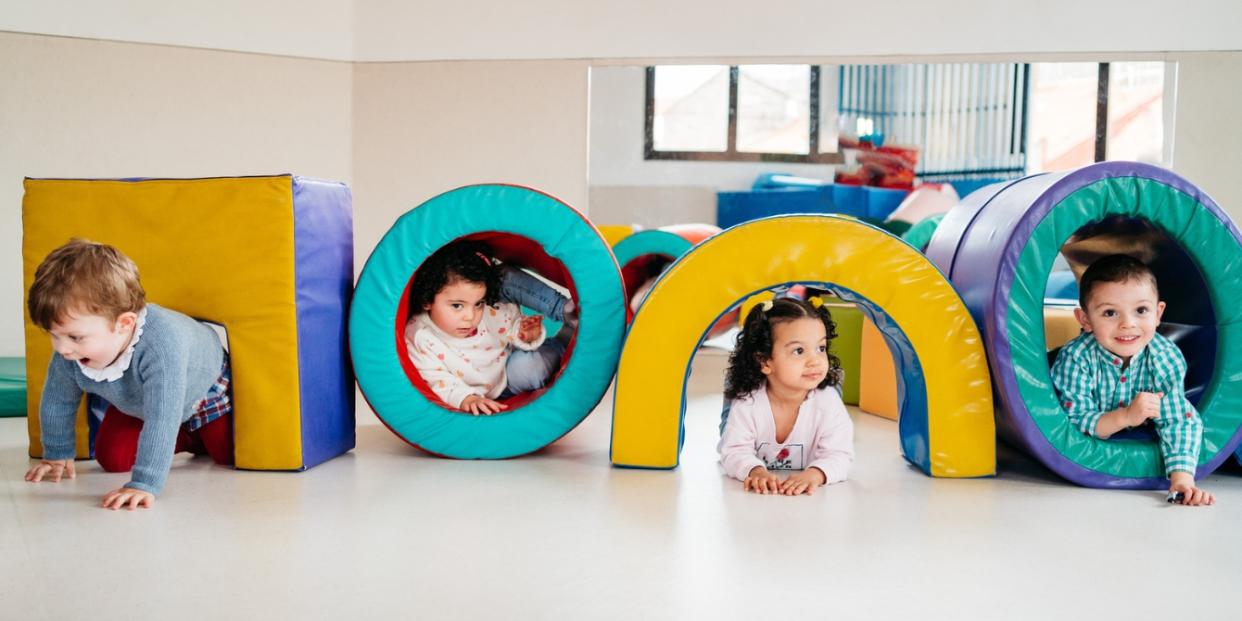Parents and librarians face off online over whether playgrounds belong in libraries

During these cold, cold (and long) winter months, being stuck inside with kids of any age can feel like a never-ending nightmare for parents. When it’s too cold to go to the playground (or other outdoor spaces), what’s a parent to do? Free, indoor play spaces are hard to come by. Most of the ones that exist, like trampoline parks, require an entrance fee. Even the ones at McDonald’s or Chik-Fil-A generally require you to buy a meal, and that’s not possible for every family.
So Molly Fleck posted on X (formerly Twitter), “I am once again begging the city to open indoor playgrounds at public libraries. My child needs somewhere to burn off energy without getting frostbite, and all the private indoor trampoline parks and such are SO expensive.”
I am once again begging the city to open indoor playgrounds at public libraries. My child needs somewhere to burn off energy without getting frostbite, and all the private indoor trampoline parks and such are SO expensive.
— Molly Fleck (@mollyfleck) January 8, 2024
It’s an idea that recognizes a struggle many parents face. Free third places for kids are extremely limited. But the discourse took off as librarians weighed in to say why that was not a good idea — even though, yes, there are existing libraries with indoor play structures and playgrounds in the U.S., as Fleck pointed out.
The. Librarians. Who. Work. At. Places. With. Indoor. Playgrounds. Have. Said. That. They. Make. Their. Jobs. Harder. In. Many. Ways.
Listen. To. Librarians. https://t.co/sczBvp3q3m— Angie Thomas (@angiecthomas) January 12, 2024
“It’s clear people want (and need) more free third places. But that doesn’t mean tacking things onto the only free third place left. Just because a library *can* have an indoor playground doesn’t mean it *should*,” librarian Alex Brown wrote in a lengthy reply.
It's clear people want (and need) more free third places. But that doesn't mean tacking things onto the only free third place left. Just because a library *can* have an indoor playground doesn't mean it *should*.
— Alex Brown
(they/them) (@QueenOfRats) January 12, 2024
As the debate took off, it made its way to TikTok, where librarians continued to weigh in. That’s where Abby, who goes by @24hourlibrary, posted a series of videos educating people on this issue.
“Libraries — public libraries in the United States specifically — are already doing too much with too little,” she said in one clip. “We don’t have enough budgets. We don’t have enough staff. We often don’t have appropriate facilities to work with. In a lot of ways, we are already trying to navigate this difficult walk of making sure that there are quiet spaces for people to work while also being an appropriate place for children to learn and grow and yes — to some extent — play.”
In her videos, Abby noted that libraries are asked to do so much in a post-Covid world: host social gatherings, offer mental health services, and even provide free community Covid testing.
“In a lot of talk about the death of the third space, and what we need to do is create more third spaces, not transform the ones that already exist to the detriment of the people working there,” she added.
In her video’s caption, she wrote, “There is so much more to say about this, but let’s start here: your public library does not need to have an indoor playground. Your public library needs partners that can offer the services and facilities that they can’t.”
In follow-up videos, Abby added even more context.
She noted that librarians and other library staff are stretched so thin, being asked to teach technology classes, follow and enforce Covid safety protocols, “the story times, the craft clubs for kids, the book clubs, and all of the different childcare functions that we end up providing.”
She added, “And we all know that if a playground is installed in a library, who is responsible for making sure that things are going safely? Who is responsible for keeping an eye on the equipment and making sure that it doesn’t need maintenance?”
Yep — librarians.
“None of this is to say, like many have been suggesting on Twitter that librarians hate children or that we’re lazy and don’t want to do anything, or just any other number of the ridiculous accusations we’re hearing,” she said. “It’s just that it’s not practical and we’re already doing so much.”
Listen to your librarians. While libraries are amazing third spaces, they can’t be our only third spaces. We need more of them to serve other needs — like free community rec centers, for example. We can have more (and historically, we did). It’s up to all of us to lobby (and vote) for politicians and policy that prioritizes these types of needs, rather than endless police funding, tax cuts for the rich and gutting social programs.

 Yahoo Lifestyle
Yahoo Lifestyle 
